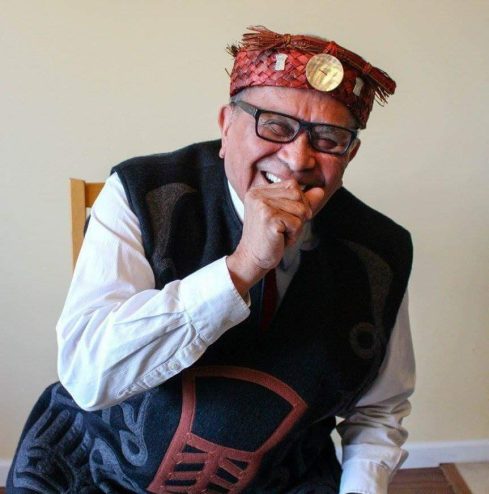Robert Joseph, Hereditary Chief of the Gwawaenuk people, grew up on a northern island off the coast of Campbell River, now known as Gilford Island.
Despite losing his father and mother to tuberculosis, his first years on this earth were surrounded by love.
Because the Kwakwakaʼwakw Village Joseph grew up in was so remote, much of his people’s traditional way of life remained intact. The only language spoken was Kwak’wala, and he became one of the language’s last native speakers.
His grandmother and community raised him with an intrinsic knowledge of the importance of the land and people he was surrounded by – and his place within that.
“Every day, almost through every act, Grandma was there to reinforce your sense of place in the universe and that you were important, cared for and loved,” said Joseph.
Then at just six years old, he was forcibly removed from life among the vibrant waters, plants and wildlife and people that had been his home.
Taken away, he was trapped behind the cold, ominous concrete walls of St Andrews Residential School in Port Alberni.
There, he and many others suffered horrendous abuse and were forced to learn how to survive within those walls – and continue living beyond them afterwards.
Joseph’s story is one of courage, facing all the ugliness and beauty within the human experience and finding the strength to forgive.
It’s a story that will make you feel all depths of emotion that everyone can learn from.
He’s shared it all in a captivating book he named Namwayut.
Namwayut is a traditional greeting in Kwak’wala. When people met, they called each other ‘Namwayut.”
“In the Kwak’wala language, this word conveys the deep understanding that we are all one. One common humanity. One connected whole,” says Joseph.
“In telling my own story, I expose my deepest vulnerabilities for a reason. I have felt succumbed to the darkness of trauma that many of us may feel, and I was able to rise above it. And so can anyone else who has emerged from trauma. And for the good people who just want to live reconciled lives, I hope that when they hear my story, they understand.”
It’s from this common understanding that Joseph hopes true reconciliation can occur.
On National Indigenous People’s Day, when we each set out to honour all the people of this land, opening your mind and heart and hearing someone’s story is truly the only place to start.
Joseph said, “It is you, reading these words, who give me hope. It is you who give me inspiration. As you read my own story, as I hope you will, you are witnessing me, and, in turn, opening yourself up to be witnessed.”
You can find and purchase Namwayut and read more info on Chief Robert Joseph here.
You can also find it at your local library. If you’re interested in starting a book club, resources can be found here to help you learn as much as possible from reading Namwayut.
To collectively help turn a new page, “you’ve got to start with the self.” Turning the pages of this book is a start.
Namwayut.










